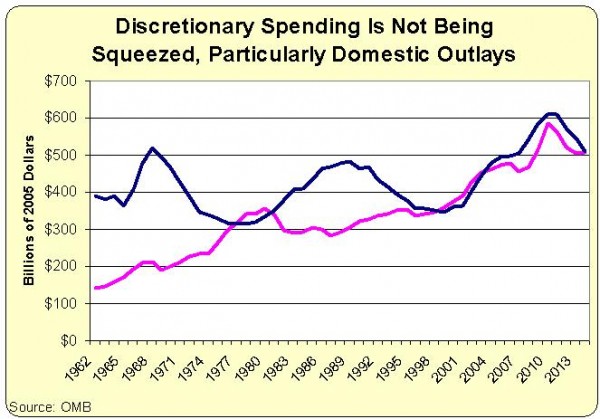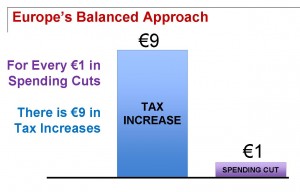If America descends into Greek-style fiscal chaos, there’s no doubt that entitlement programs will be the main factor. Social Security, Medicare, Medicaid, and Disability are all fiscal train wrecks today, and the long-run outlook for these programs is frightful.
Just look at these numbers from the Bank for International Settlements and OECD to see how our fiscal future is bleaker than many of Europe’s welfare states.
If we don’t implement the right kind of entitlement reform, our children and grandchildren at some point will curse our memory.
But that doesn’t mean we shouldn’t worry about other parts of the budget, including the so-called discretionary programs that also have been getting bigger and bigger budgets over time.
That’s why I was a bit perturbed to read Veronique de Rugy’s piece in National Review Online, which implies that these programs are “shrinking” and being subject to a “Big Squeeze.”
…there is another number to look at in that budget. It’s the shrinking share of the budget consumed by discretionary spending (spending on things like defense and infrastructure) to make space for mandatory spending and interest. This is the Big Squeeze. …in FY 2014 mandatory spending plus interest will eat up 67 percent of the budget, leaving discretionary spending with 33 percent of the budget (down from 36 percent in FY 2012). Now by FY 2023, mandatory and interest spending will consume 77 percent of the total budget. Discretionary spending will be left with 23 percent of the budget.
But all that’s really happening here is that entitlement outlays are growing faster than discretionary spending.
Here’s some data from the Historical Tables of the Budget, showing what is happening to spending for both defense discretionary and domestic discretionary. And these are inflation-adjusted numbers, so the we’re looking at genuine increases in spending.

As you can see, defense outlays have climbed by about $100 billion over the past 50 years, while outlays for domestic discretionary programs have more than tripled.
If that’s a “Big Squeeze,” I’m hoping that my household budget experiences a similar degree of “shrinking”!
To be fair, Veronique obviously understands these numbers and is simply making the point that politicians presumably should have an incentive to restrain entitlement programs so they have more leeway to also buy votes with discretionary spending.
But I’d hate to think that an uninformed reader would jump to the wrong conclusion and decide we need more discretionary spending.
Particularly since the federal government shouldn’t be spending even one penny for many of the programs and department that are part of the domestic discretionary category. Should there be a federal Department of Transportation? A federal Department of Housing and Urban Development? A federal Department of Agriculture?
No, NO, and Hell NO. I could continue, but you get the idea.
The burden of federal government spending in the United States is far too high and it should be reduced. That includes discretionary spending and entitlement spending.
 P.S. Since I don’t want to get on Veronique’s bad side, let me take this opportunity to call attention to her good work on properly defining austerity,. And if you watch her testimony to a congressional committee, it’s also quite obvious that she also understands that the real problem is bloated and wasteful government spending.
P.S. Since I don’t want to get on Veronique’s bad side, let me take this opportunity to call attention to her good work on properly defining austerity,. And if you watch her testimony to a congressional committee, it’s also quite obvious that she also understands that the real problem is bloated and wasteful government spending.
P.P.S. For those who don’t have the misfortune of following the federal budget, “entitlements” are programs that are “permanently appropriated,” which simply means that spending automatically changes in response to factors such as eligibility rules, demographic shifts, inflation, and program expansions. Sometimes these programs (such as Social Security, Medicare, Medicaid, etc) are referred to as “mandatory spending.”
The other big part of the budget is “discretionary spending” or “appropriations.” These are programs funded by annual spending bills from the Appropriations Committees, often divided into the two big categories of “defense discretionary” and “nondefense discretionary.”
